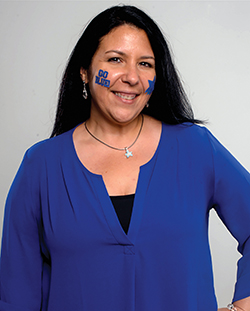Rectal Cancer Survivor
Empower Yourself to Find the Best Treatment Options
 Unexpected rectal bleeding prompted Marra Lashbrook Rodriguez to get a colonoscopy. To her surprise, the results showed she had Stage IIIB rectal cancer at only 39 years old. She had chemotherapy and radiation therapy, and surgery to remove her rectum and colon. Through her faith and the support of her husband and two sons, she is living life to the fullest. She shares her experience with others as an ambassador for Fight Colorectal Cancer, and she urges others with colorectal cancer to know their biomarkers, advocate for themselves and find the friends and family who will diligently support them.
Unexpected rectal bleeding prompted Marra Lashbrook Rodriguez to get a colonoscopy. To her surprise, the results showed she had Stage IIIB rectal cancer at only 39 years old. She had chemotherapy and radiation therapy, and surgery to remove her rectum and colon. Through her faith and the support of her husband and two sons, she is living life to the fullest. She shares her experience with others as an ambassador for Fight Colorectal Cancer, and she urges others with colorectal cancer to know their biomarkers, advocate for themselves and find the friends and family who will diligently support them.
About two years before I was diagnosed, I began having symptoms but I assumed they were from other issues. For example, my stool thinned but I thought it was from my pregnancy. I lost weight but assumed it was from dieting. I spotted blood when I wiped but assumed it was from hemorrhoids.
The rectal bleeding increased with time, and I met with a GI doctor. She also assumed hemorrhoids caused the bleeding because I had no family history of colorectal cancer, and I was only 39 years old. She scheduled a colonoscopy, which she moved up after my bleeding alarmingly picked up. The results showed a large mass in my lower rectum that appeared to be cancerous. On September 23, 2013, my life’s trajectory officially changed forever when I was diagnosed with Stage IIIB rectal cancer.
At first, my reaction was one of devastation. My boys were 5 and 7 years old, and all I could think about was them growing up without their mother. Within 24 hours, I realized my faith had prepared me for this tragic diagnosis. I found peace and strength in a very powerful, surrendering faith-filled prayer called Suspice by St. Ignatius of Loyola. I asked God to give me the strength to prepare my children. I surrendered to the experience. I also chose to find joy in the journey. Once I took that step, I had the strength to pursue multiple opinions and ended up in the care management team I desired, which brought me peace and consolation.
Because I was considered fairly young to be diagnosed with rectal cancer, my oncologist did genetic testing. However, I was told my occurrence was not genetic in nature.
I trusted my doctors for most of my information. I also searched the Internet, which is how I found Fight Colorectal Cancer (CRC) and its educational resources.
A little more than a month after my diagnosis, I started neoadjuvant chemoradiation. I completed about 30 radiation treatments, along with chemotherapy. Three months later, I had lower anterior resection surgery, followed by a laparoscopic restorative proctectomy with construction of a colonic J-pouch (anal anastomosis) and temporary loop ileostomy. About a month later, I had surgery to install a port for chemotherapy. From March to July, I received eight chemotherapy treatments. I had the port removed the following September.
I had many of the usual side effects (infertility, inflammation, cold sensitivity, neuropathy, fatigue, etc.) from radiation therapy and chemotherapy. I recommend that patients pursuing radiation therapy speak to their radiation oncologist in detail about side effects and the steps to minimize long-term side effects. With chemotherapy, make sure to be vigilant of neuropathy symptoms and speak to your doctor about changes that can be made during treatment to minimize it long term.
If you have an ostomy, I recommend you have an ostomy nurse walk you through the experience and guide you in finding the right supplies for you. Family and friends played a major role in supporting me and my family during treatment, offering prayers, meals, cleaning, babysitting, taking the kids out, entertainment, transportation and more.
In the process, I learned to advocate for myself, asking my doctors important questions such as “What are my biomarkers?” My doctors have been very open to me asking questions and informing us about my cancer. This is another way I’ve found peace.
Through this experience, my introverted soul has become an outspoken advocate on behalf of all people, and especially those facing cancer. I do everything I can to get the same reliable information I depended on into other patients’ hands and support them. I help patients find joy in the darkest hours, just like I did. I encourage them to find milestones, small wins and reasons to celebrate.
As a Fight CRC Ambassador, I bring awareness to the public, sharing my perspective with lawmakers for policy changes and helping get life-saving resources into the hands of patients.
I am not afraid of the cancer returning, but I am realistic and vigilant about the possibility of recurrence or secondary cancers. I handle that reality with education, faith and hope. I pay attention to my body and monitor it accordingly. I offer my experience, my family’s experience, my prayers and my soul in support.


